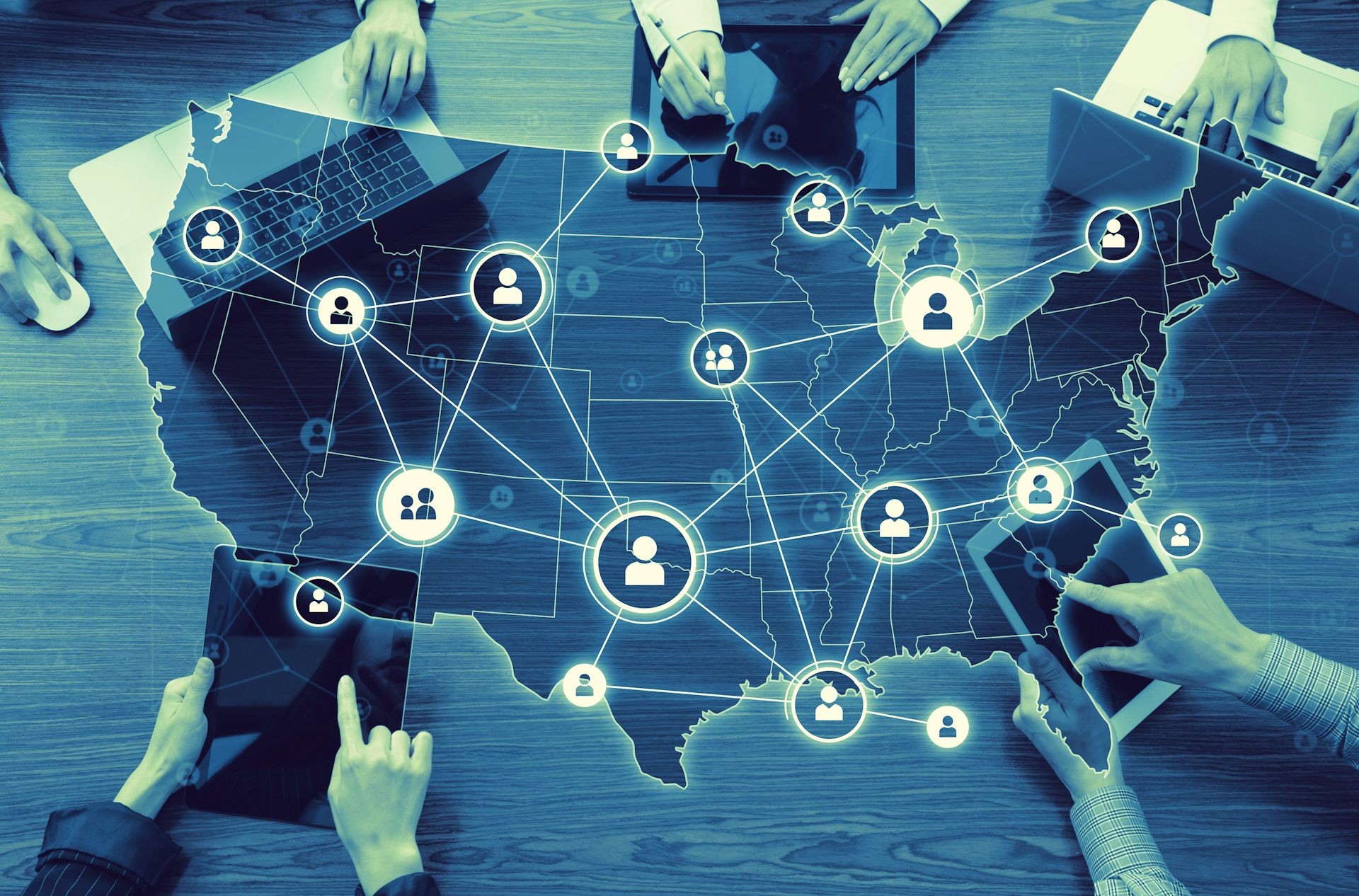What happened at Davos? 8 essential reads
The Conversation scholars analyze a few of the key themes and speeches that punctuated the three-day gathering of global elites in the Alps.

Editor’s note: This is a roundup of material from The Conversation’s coverage of the 2018 World Economic Forum.
The annual gathering of global elites known colloquially as Davos is over – in case you missed it. So what does it matter?
While the rare attendance of the president of the United States may have made the biggest splash, several thousand other leaders in business, politics, academia and, well, celebritydom ensured there was plenty of other star wattage at the World Economic Forum’s three-day meeting in the Alps.
A few heads of state auditioned to take the U.S. president’s place as “leader of the free world,” while other attendees assessed the risks likely to batter the world economy in coming months and years. And the parties this year – we hear – were epic.
To help readers pierce the luxury bubble that surrounded the Alpine town of Davos from Jan. 23-26, we’ve been asking experts to examine some of the key themes and speeches.
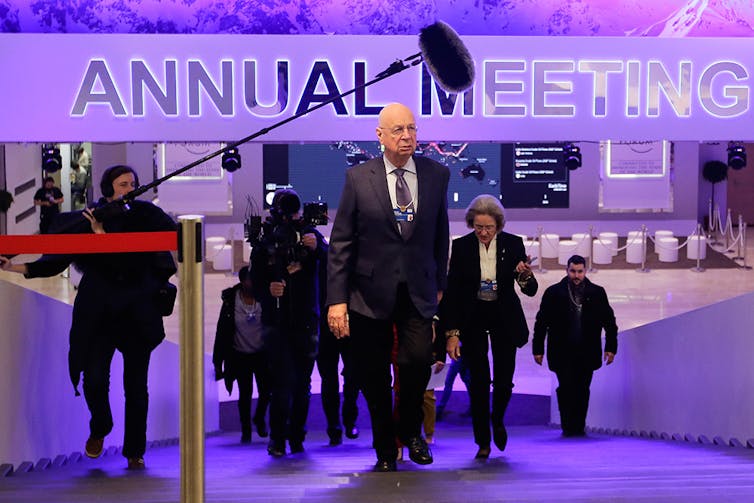
1. A Davos primer and reading list
Since it was President Donald Trump’s first time attending Davos, we thought he might like a primer.
To that end, University of St. Thomas professor of ethics and business law Christopher Michaelson, who has previously attended the meeting, offered a little history on the World Economic Forum and suggested three novels and a children’s book to help the president acclimate himself to the unique culture at Davos.
“If only Trump could get over his distaste for books and read them,” Michaelson wrote.
2. Inequality, dishwashers and Elton John
The main theme at Davos was “Creating a Shared Future in a Fractured World,” which put growing concerns about inequality front and center. While receiving an award, musician and philanthropist Elton John decried economic inequality as “disgraceful.”
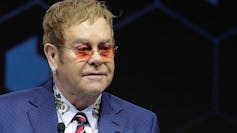
Michele Gilman, a professor of law at the University of Baltimore, gave the Davos elite credit for grappling with inequality but cautioned the issue won’t be meaningfully addressed until the forum panels “include the voices and concerns of everyone who doesn’t get to go there.”
“Politicians have little incentive to tackle these problems because they are beholden to the interests of their donors,” she wrote. “Until the drivers and dishwashers toiling in the chalets at Davos – along with their working brothers and sisters across the globe – get the microphones and push the levers of policy, economic inequality is likely to persist and perhaps get worse.”
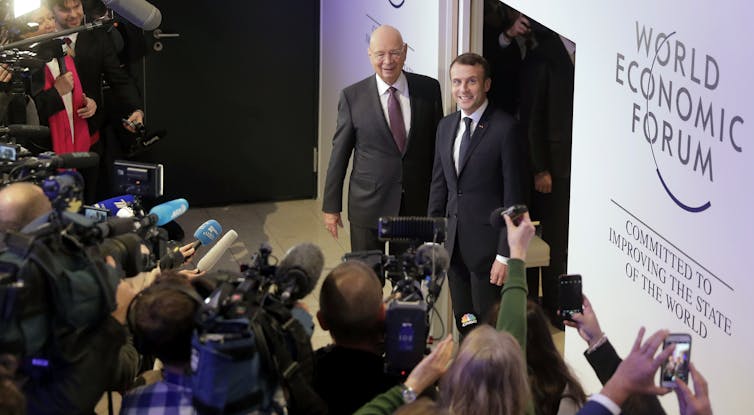
3. Macron makes his own splash
French President Emmanuel Macron, in his own special address at the forum, declared “France is back!” – in English – as he touted his government’s reforms meant to improve French productivity and competitiveness.
But when Macron switched to French, he made a very different argument, wrote University of Michigan history professor Joshua Cole, in which he decried growth at any cost and called for a new “global contract” to replace globalization and fend off nationalists. It’s a “compelling vision” that may be hard to achieve, Cole argued.
“For Macron this is the danger of the present moment: a relapse into a sterile nationalism that is incapable of addressing the real challenges posed by the present,” he wrote. “Macron’s hope is that a united Europe might play this mediating role. A democratic Europe might thread the needle between the unregulated capitalism often endorsed by the United States and the statist and anti-democratic model provided by China.”
4. A coal clash
During the speech, Macron also pledged to end his country’s use of coal within four years – in sharp contrast to his American counterpart’s express interest in pushing policies that favor the fossil fuel. Jay Zagorsky, an Ohio State University economist, explained why the rhetoric of both leaders won’t be able to change the laws of economics.
“Politicians can claim all they want that they are for or against coal in Davos’ forums, making grand promises about ending the use of the dirty fuel or declaring their plans to make it cheaper to use as a way to protect jobs,” he wrote. “No matter what they say in speeches, however, economic forces will inevitably dictate whether reality can match their words.”
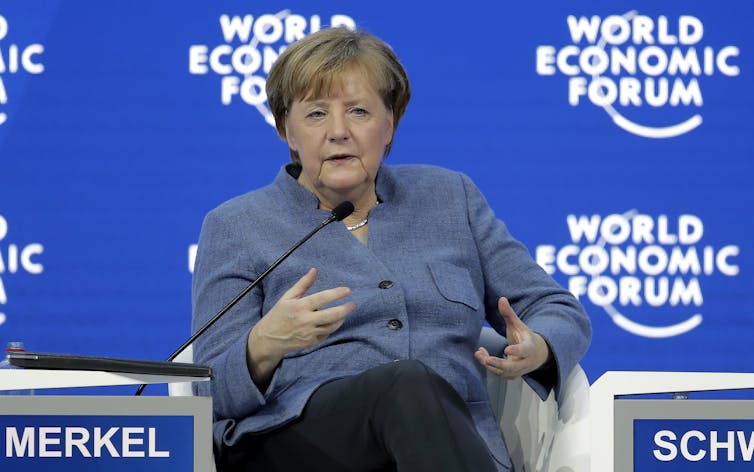
5. Merkel looks back and forward
German Chancellor Angela Merkel, another candidate for leader of the free world, spoke about a digital divide separating generations of Germans. Elizabeth Heineman, of the University of Iowa, delved into the history that makes Germans more cautious than Americans about turning their data over to businesses or the state.
“Merkel’s – and Europe’s – quandary is this: how to move forward in the digital age when Europe’s contribution is to seek balance between state power, individual rights and the dynamism of capitalism,” she wrote.
In her speech, Merkel worried about Germany being steamrolled as it conducted “philosophical debates about the sovereignty of data.”
But commentator Heineman argues that “achieving any balance – means slowing things down. It means philosophizing.”
6. A currency crash
The Trump administration was already making headlines well before the president himself arrived in Davos on Jan. 25. Treasury Secretary Steve Mnuchin, for one, caused the dollar to nosedive after he broke with longstanding tradition and said a weak greenback would be “good” for the U.S.
Benjamin Cohen, professor of international political economy at the University of California, Santa Barbara, described what was so “alarming” about Mnuchin’s words.
“It came as a shock to many – including me – when Mnuchin declared that a depreciation of the greenback is ‘obviously’ welcome,” Cohen wrote. “Prolonged depreciation could severely erode the dominant position of the greenback as the world’s leading currency.”
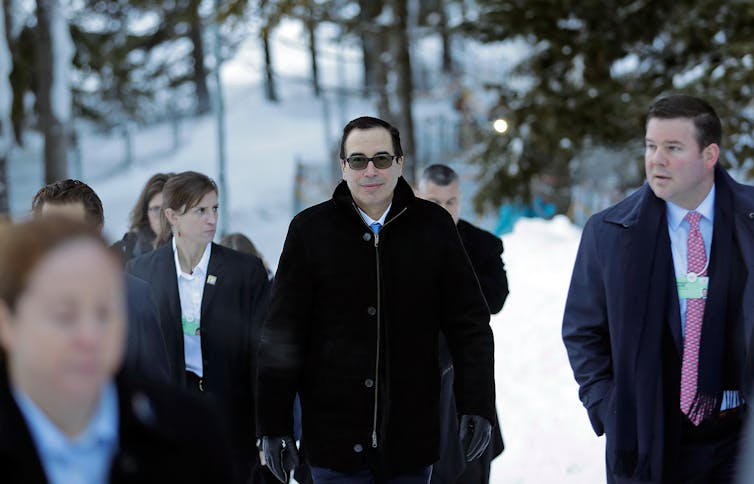
7. Trump strikes a chord
Trump, in his 15-minute speech to forum delegates, sought to make his “America First” policies palatable to an audience much more inclined to international alliances and plotting a course toward a shared future.
While the president’s words were well-received in some quarters for their perceived pragmatism, they struck a discordant note in the ears of at least one person in attendance. Stephen D. Smith, director of Shoah Foundation at the University of Southern California, argued that Trump’s promotion of a “my country first” brand of isolationism turns the main theme of the forum on its head, more likely fracturing the world than sharing it.
“Trump’s insistence that ‘putting America first’ is his duty as president – just as other heads of state must do so in their own countries – ignores the many political leaders at Davos, such as France’s Emmanuel Macron or Germany’s Angela Merkel, who were genuinely trying to find shared interests at the forum,” Smith wrote.
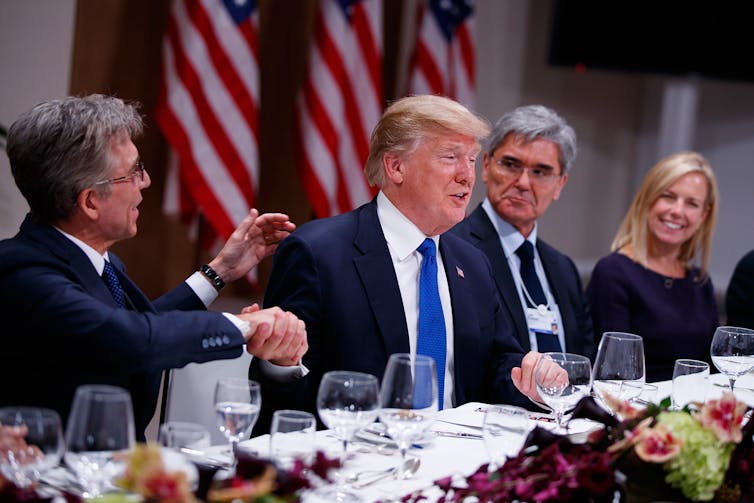
8. Bullish billionaires
Trump’s words had a very different impact on at least some of the business leaders and billionaires in attendance, who seem to have decided to look past the differences in style they find less appealing and focus on the impact of “pro-business” policies such as tax cuts and deregulation.
However, Georgia State political scientist Charles Hankla cautioned it’s a bit too soon to celebrate.
“It is important to remember that the long-term business costs of Trump’s destabilizing influence are likely to be much greater than any short-term policy benefits,” he argued. “This is because businesses must operate within a social and political context, one which influences their success at every step.”
Read These Next
FDA claims on COVID-19 vaccine safety are unsupported by reliable data – and could severely hinder v
The agency’s plan to change the well-established process for safety testing vaccines is not realistic.
A hard year for federal workers offers a real-time lesson in resilience
During a year of extraordinary uncertainty, workers built resilient networks within and across boundaries…
Why one theologian’s advice for a bitterly divided nation holds true today
Sebastian Castellio penned one of the first arguments for religious freedom – but it went unheeded…



